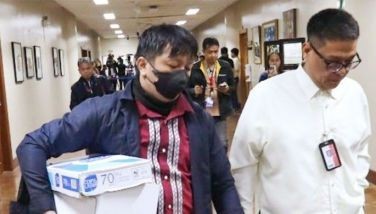Dirty money still abounds

The Marcos administration is popping the champagne over the country’s exit from the gray list of the Paris-based Financial Action Task Force (FATF).
It is good news, after all, and there’s definitely a reason for the Anti-Money Laundering Council, chaired by Bangko Sentral ng Pilipinas Governor Eli Remolona Jr., to celebrate.
Their hard work has paid off. “This achievement is a result of strong cooperation within the government as well as the private sector. It also complements our ongoing efforts to make the financial system a stronger driver of sustainable growth,” Gov. Eli said.
Congratulations to Gov. Eli and to the rest of the AMLC, which includes the Securities and Exchange Commission, headed by SEC chairman Emilio Aquino, and the Insurance Commission, headed by Reynaldo Regalado.
The FATF removed the Philippines from its gray list – or countries under heavy scrutiny by the money laundering watchdog – after nearly four years, or since its inclusion in June 2021.
This came after an FATF team’s on-site visit in January where our officials reported on the country’s progress in strengthening measures on anti-money laundering and combating the financing of terrorism.
FATF president Elisa de Anda Madrazo cited the country’s efforts, which include actively combating the risk of dirty money flowing through casinos as well as banning Philippine offshore gaming operators (POGOs) last year.
The country, she said, strengthened the effectiveness of its anti-money laundering framework to meet commitments outlined in its action plan, including demonstrating effective risk-based supervision of non-financial businesses and professions. We were also able to convince the FATF that risks associated with casino junkets have been mitigated.
The POGO ban, I believe, sealed the deal, because illegal POGOs were found to be synonymous with criminal activities, including money laundering.
What does the gray list exit mean?
Gov. Eli said our recent exit from the gray list bodes well for overseas Filipino workers as it would mean lower transaction costs. It would also translate to more investments for the country.
I personally experienced the negative consequences of the Philippines’ inclusion on the gray list, just two years ago while I was in Europe.
As I wrote in a previous column “We, the launderers” on Oct. 26, 2023, upon landing at the airport in this European country, a group of Filipinos, myself included, immediately went to a foreign exchange booth to change some dollars into local currency. The man at the counter, however, turned us down.
The Philippines, he said, was on a list of countries being monitored for money laundering. We were stunned and speechless but too embarrassed to say anything.
Fast forward to today. The Marcos administration can definitely count our gray list exit as an accomplishment.
But. And there’s a big but – let’s not be fooled.
There’s still so much dirty money going around the country today, even with POGOs gone.
Aren’t you curious, for instance, where our corrupt politicians put the money they steal from us? Some use dummies, some put up fly-by-night businesses, etc.
I had a talk with a banker from a major bank in the Philippines.
The manager said that while banks have really tightened the rules against money laundering, the launderers have not run out of channels through which they launder their dirty money.
Some examples, according to my banker source – casinos (some are still notorious for laundering money); lending entities; jewelry businesses; prized and rare art; sale of second-hand cars including sports cars and real estate.
A letter sender even speculates:
“Our property market is a bubble that should have popped years ago but one reason it hasn’t popped is that all the trillions in dirty stolen monies (from corrupt politicians, government officials and their conspirators, smugglers, drug dealers and similar lowlifes) continue to find their way to the sector.”
Even the luxury goods industry is getting a boost from all the stolen money, including funds siphoned by corrupt government officials, the reader said.
Could this be the reason why some of our lawmakers are investing in six- to seven-digit designer bags such as Hermés, Dior or Chanel and sleek watches like the ultra expensive Rolex and many more?
There’s also talk going around the Republic of Marites that some banks seem to be more lax than others, making them a preferred choice among politicians.
Others are more careful though. Some just keep their cold cash in vaults at home or in properties such as a hotel they own.
Against this backdrop, our officials cannot rest on their laurels. There’s still a lot of money moving around, say my sources from the business community.
It’s not to say that I disagree with the FATF decision. I laud our officials – the exit is a major step.
As another source explained, based on the risk assessment of the FATF, the country has demonstrated that the Marcos administration has sufficiently addressed the issues and made significant progress.
Moving forward, our anti-money laundering authorities must remain vigilant. They must continuously monitor those who handle big money, including lawyers and real estate brokers.
Dirty money, like corruption, may never be totally eradicated but we need to keep on fighting it to help reduce transnational crimes including human trafficking and drugs, which can destroy our society.
It’s pretty simple. A country notorious for money laundering turns off legitimate investors and instead attracts criminals.
Surely, we don’t want that. We already have enough thieves in this Republic.
* * *
Email: eyesgonzales@gmail.com. Follow her on Twitter @eyesgonzales. Column archives at EyesWideOpen on FB.
- Latest
- Trending




























